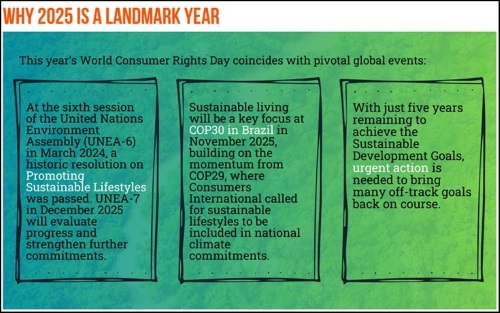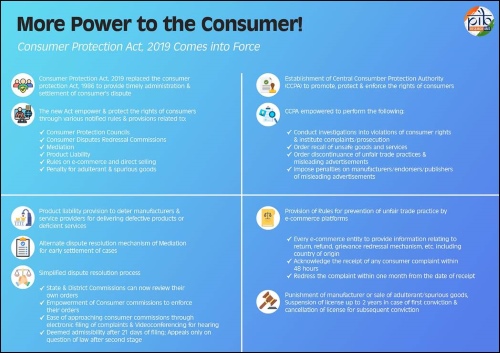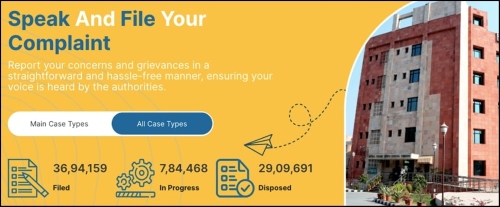World Consumer Rights Day, observed annually on March 15, highlights the importance of consumer rights and protection. This day serves as a reminder to promote and safeguard consumer interests worldwide. First observed in 1983, March 15, 1962, marks the date President John F. Kennedy addressed the US Congress and became the first world leader to formally recognise consumer rights.
World Consumer Rights Day Theme for 2025
The theme of World Consumer Rights Day 2025 is ‘A Just Transition to Sustainable Lifestyles.’ The 2025 theme underscores the necessity of making sustainable and healthy lifestyle choices accessible and affordable for all consumers while ensuring that fundamental rights are upheld. This year’s campaign emphasises the pathways needed to achieve sustainable lifestyles and calls for stronger consumer protection and empowerment worldwide.

Source:pib
Key Initiatives in Consumer Protection
Consumer Protection Act, 2019
To modernise consumer protection in the era of globalisation, digital commerce, and technological advancements, the Consumer Protection Act, 1986, was replaced by the Consumer Protection Act, 2019. This legislation introduced a three-tier quasi-judicial system—Consumer Commissions—at the District, State, and National levels to provide swift and effective resolution of consumer disputes, including those related to unfair trade practices.
According to Section 38(7) of the Act, consumer complaints should be resolved within three months if no product testing is required and within five months if analysis or testing is necessary.

Source:pib
Consumer Welfare Fund
The Consumer Welfare Fund (CWF) aims to support initiatives that promote consumer rights and welfare. The fund is allocated to States and Union Territories (UTs) as seed money on a 75:25 basis (90:10 for Special Category states/UTs) to create a Consumer Welfare Corpus Fund. These funds are used for projects addressing local consumer welfare needs.
During FY 2024-25, ₹32.68 crore was allocated to various states to enhance their Consumer Welfare Funds. As of now, 24 States and 1 UT have established these funds to support consumer-centric projects.
Strengthening Consumer Grievance Redressal Mechanisms
Expansion of E-Daakhil for Online Consumer Complaints
The E-Daakhil portal, launched on September 7, 2020, by the National Consumer Dispute Redressal Commission, facilitates the hassle-free filing of consumer complaints. It provides a digital interface where consumers can submit complaints and track their status online, ensuring a paperless and transparent process.
To further enhance digital consumer grievance redressal, the government has introduced e-Jagriti, an upgraded version of E-Daakhil. This platform streamlines case filing, tracking, and management, ensuring seamless communication between parties and reducing paperwork, delays, and inefficiencies in the consumer dispute resolution process.

Source:pib
Enhancements to the National Consumer Helpline (NCH)
The National Consumer Helpline (NCH) serves as a centralized platform for consumer grievance redressal. The NCH 2.0 initiative incorporates AI-powered speech recognition, multilingual chatbot assistance, and extended language support in 17 languages, including Hindi, English, and regional dialects.
The helpline has witnessed a significant increase in usage, with calls rising from 12,553 in December 2015 to 1,55,138 in December 2024. Consumers can register complaints via toll-free number 1915 or through the Integrated Grievance Redressal Mechanism (INGRAM) portal, which allows submissions via WhatsApp, SMS, email, the NCH app, web portal, and the Umang app.
NCH has also partnered with over 1000 companies under its Convergence Programme to expedite grievance resolution in sectors such as e-commerce, travel, education, consumer durables, automobiles, and banking.

Source:pib
Jaago Grahak Jaago Portal and Mobile App
The Jaago Grahak Jaago initiative has expanded with an online portal and a mobile application that alert consumers about potentially unsafe e-commerce websites. This platform empowers consumers by providing vital information on online transactions and enhancing awareness about consumer rights in digital marketplaces.
Consumer Protection in E-Commerce and Digital Transactions
New E-Commerce Guidelines

Source:pib
The Consumer Protection (E-commerce) Rules, 2020, framed under the Consumer Protection Act, 2019, define the responsibilities of e-commerce entities and ensure fair trade practices. These regulations address issues such as deceptive pricing, unfair refund policies, and misleading advertisements to safeguard consumer interests.
To further regulate deceptive online practices, the Central Consumer Protection Authority (CCPA) issued the Guidelines for Prevention and Regulation of Dark Patterns 2023, on November 30, 2023. These guidelines target 13 specific deceptive practices in e-commerce that mislead consumers.
E-Commerce: Principles and Guidelines for Self-Governance (BIS Draft Standard)
The Bureau of Indian Standards (BIS) has proposed a draft standard titled "E-Commerce: Principles and Guidelines for Self-Governance." This framework aims to establish a transparent, ethical, and consumer-friendly digital marketplace. It outlines guidelines for pre-transaction, contract formation, and post-transaction phases, ensuring:
- Clear product disclosures, including pricing, seller details, return policies, and country of origin
- Prevention of deceptive pricing and misleading advertisements
- Secure payment processes and transparent refund policies
- Protection against counterfeit products and unfair trade practices
- Stronger grievance redressal mechanisms
- Data privacy protections and explicit consumer consent for marketing communications
Once implemented, these standards will enhance consumer trust, promote ethical business practices, and ensure a more accountable e-commerce ecosystem in India.
Conclusion
As India observes World Consumer Rights Day 2025, the focus remains on strengthening consumer protection laws, ensuring transparent digital transactions, and enhancing grievance redressal mechanisms. Through initiatives such as E-Daakhil, NCH 2.0, and stricter e-commerce regulations, the government is striving to create a safer, fairer, and consumer-friendly marketplace. The ongoing efforts will empower consumers and pave the way for sustainable and ethical consumption practices in India.
Comments
All Comments (0)
Join the conversation